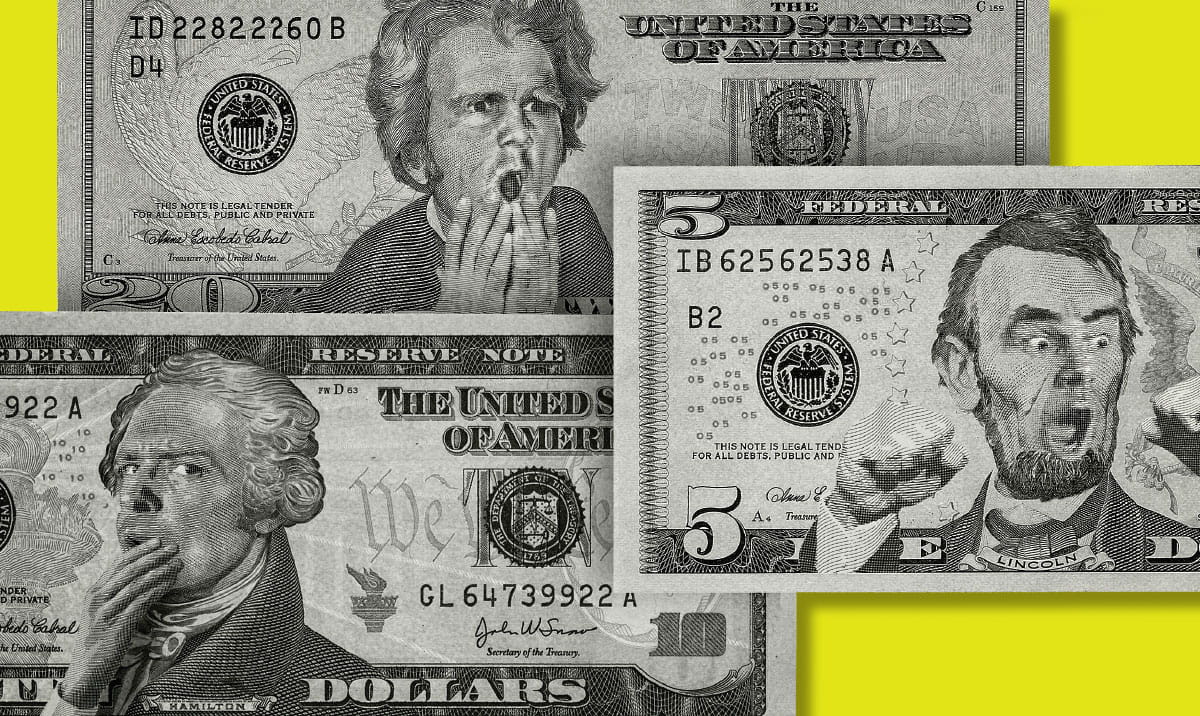Are we getting rid of cash?
Is cash going to disappear?
As people move toward more electronic or digital forms of payment, it might seem like paper money is on its way toward obsolescence. But experts say that cash will always be around.
Are we moving to a cashless society?
The concept of a cashless society has been around for decades. But with 80% of payments in the US being made digitally in 2022, and four in ten of us ditching change altogether, research suggests that the transition from physical currency could take place sooner than we once thought.
How much longer will we be using cash?
“Within the next 20 years, the world will go fully cashless. Money will be in digital format, just like credit cards, bank accounts and PayPal.
Will there still be cash in 2030?
We can’t quite see where cash will be exactly in 2030, but near-term projections see a continuation of the decline. Globally, the GPR projects cash will fall from 20.5% of global point-of-sale transactions to just 12.7% by 2024.
What will replace money in the future?
There are three types of digital currency: cryptocurrency, stablecoins and CBDCs. Cryptocurrency is a form of decentralized digital currency that isn’t pegged to any fiat currency. It uses cryptography to manage its ledger systems, and the market determines its value. Bitcoin was the first cryptocurrency.
Why not to keep money in cash?
Cash Can Deteriorate
Keeping money at home is also risky because it can get damaged. Cash is stronger than, say, printer paper, but it can still rip, rot and mold. This could be a real concern if you live in an area prone to flooding or high humidity.
What happens if we go cashless?
Cashless society: advantages
One major advantage of going cashless is a significant reduction in crime. When people are handling less cash, bank robberies, burglaries and corruption drop.
Why does the Government want to get rid of cash?
Why Eliminate Cash? Cash can play a role in criminal activities such as money laundering and allow for tax evasion. Digital transactions or electronic money create an audit trail for law enforcement and financial institutions and can aid governments in economic policymaking.
Should I take my money out of the bank 2023?
Do no withdraw cash. Despite the recent uncertainty, experts don’t recommend withdrawing cash from your account. Keeping your money in financial institutions rather than in your home is safer, especially when the amount is insured. “It’s not a time to pull your money out of the bank,” Silver said.
Why does the government want to get rid of cash?
Why Eliminate Cash? Cash can play a role in criminal activities such as money laundering and allow for tax evasion. Digital transactions or electronic money create an audit trail for law enforcement and financial institutions and can aid governments in economic policymaking.
Will cash be king in recession?
Having a large amount of cash on hand can provide a protective buffer against financial losses and allow for the opportunity to purchase discounted assets during a market downturn. In the current economic climate, with unprecedented levels of market uncertainty, cash can still be a valuable resource.

Is cash going to disappear
As people move toward more electronic or digital forms of payment, it might seem like paper money is on its way toward obsolescence. But experts say that cash will always be around.
Cached
Are we moving to a cashless society
The concept of a cashless society has been around for decades. But with 80% of payments in the US being made digitally in 2022, and four in ten of us ditching change altogether, research suggests that the transition from physical currency could take place sooner than we once thought.
How much longer will we be using cash
“Within the next 20 years, the world will go fully cashless. Money will be in digital format, just like credit cards, bank accounts and PayPal.
Cached
Will there still be cash in 2030
We can't quite see where cash will be exactly in 2030, but near-term projections see a continuation of the decline. Globally, the GPR projects cash will fall from 20.5% of global point-of-sale transactions to just 12.7% by 2024.
What will replace money in the future
There are three types of digital currency: cryptocurrency, stablecoins and CBDCs. Cryptocurrency is a form of decentralized digital currency that isn't pegged to any fiat currency. It uses cryptography to manage its ledger systems, and the market determines its value. Bitcoin was the first cryptocurrency.
Why not to keep money in cash
Cash Can Deteriorate
Keeping money at home is also risky because it can get damaged. Cash is stronger than, say, printer paper, but it can still rip, rot and mold. This could be a real concern if you live in an area prone to flooding or high humidity.
What happens if we go cashless
Cashless society: advantages
One major advantage of going cashless is a significant reduction in crime. When people are handling less cash, bank robberies, burglaries and corruption drop.
Why does the Government want to get rid of cash
Why Eliminate Cash Cash can play a role in criminal activities such as money laundering and allow for tax evasion. Digital transactions or electronic money create an audit trail for law enforcement and financial institutions and can aid governments in economic policymaking.
Should I take my money out of the bank 2023
Do no withdraw cash. Despite the recent uncertainty, experts don't recommend withdrawing cash from your account. Keeping your money in financial institutions rather than in your home is safer, especially when the amount is insured. "It's not a time to pull your money out of the bank," Silver said.
Why does the government want to get rid of cash
Why Eliminate Cash Cash can play a role in criminal activities such as money laundering and allow for tax evasion. Digital transactions or electronic money create an audit trail for law enforcement and financial institutions and can aid governments in economic policymaking.
Will cash be king in recession
Having a large amount of cash on hand can provide a protective buffer against financial losses and allow for the opportunity to purchase discounted assets during a market downturn. In the current economic climate, with unprecedented levels of market uncertainty, the importance of cash cannot be overstated.
Which currency will replace the dollar
"The only currency that is vaguely close to being able to replace the dollar is the euro."
Will the dollar ever be replaced
The short answer: The dollar's dominance is unlikely to change in the near future, and it will remain the principal currency of international trade and transactions, analysts told Al Jazeera. No other currency is close to replacing it.
Is 100k in savings a lot
But some people may be taking the idea of an emergency fund to an extreme. In fact, a good 51% of Americans say $100,000 is the savings amount needed to be financially healthy, according to the 2022 Personal Capital Wealth and Wellness Index. But that's a lot of money to keep locked away in savings.
Is money safer in cash or bank
A bank account is typically the safest place for your cash, since banks can be insured by the Federal Deposit Insurance Corp. up to $250,000 per depositor, per insured institution, per ownership category. Banks that are insured by the FDIC often say “Member FDIC” on their websites.
Why should we get rid of cash
Why Eliminate Cash Cash can play a role in criminal activities such as money laundering and allow for tax evasion. Digital transactions or electronic money create an audit trail for law enforcement and financial institutions and can aid governments in economic policymaking.
Why we should keep cash
It helps you keep track of your expenses.
Cash allows you to keep closer control of your spending, for example by preventing you from overspending.
Can banks seize your money if economy fails
The short answer is no. Banks cannot take your money without your permission, at least not legally. The Federal Deposit Insurance Corporation (FDIC) insures deposits up to $250,000 per account holder, per bank.
What are the new cash withdrawal rules 2023
Further changes in Budget 2023 have introduced changes for co-operative bank or societies, the threshold limit for annual cash withdrawals has been increased to Rupees 3 crores from Rupees 1 crore.
Which banks are in trouble in 2023
7 Banks to Dump Now Before They Go Bust in 2023
| SHFS | SHF Holdings | $0.50 |
|---|---|---|
| HMST | HomeStreet | $6.17 |
| WAL | Western Alliance | $27.32 |
| ECBK | ECB Bancorp | $11.24 |
| PACW | PacWest Bancorp | $5.97 |
Should I withdraw cash during recession
You should only make withdrawals from your bank during a recession if you need to spend it or reinvest it. Remember, as long as you abide by FDIC regulations, your money is protected by the federal government and you won't lose a dime due to a bank failure.
Should I keep cash before recession
Liquidity. Your biggest risk in a recession is the loss of your job, if you're still employed or semi-employed. If you need to tap your savings for living expenses, a cash account is your best bet. Stocks tend to suffer in a recession, and you don't want to have to sell stocks in a falling market.
What happens if the US dollar collapses
If the U.S. dollar collapses, the cost of imports will become more expensive, the government will not be able to borrow at current rates, resulting in a deficit that will need to be filled by increasing taxes or printing money, inflation will skyrocket due to the higher cost of imports and the printing of money, …
Will the dollar weaken in 2023
The US dollar has eased from its peak level, but exchange rate volatility will remain elevated in 2023 on the back of global macroeconomic uncertainty. However, although the dollar is likely to decline further in 2023, it is expected that exchange rate volatility will remain elevated.
Will the dollar drop in 2023
The US dollar has eased from its peak level, but exchange rate volatility will remain elevated in 2023 on the back of global macroeconomic uncertainty. However, although the dollar is likely to decline further in 2023, it is expected that exchange rate volatility will remain elevated.
